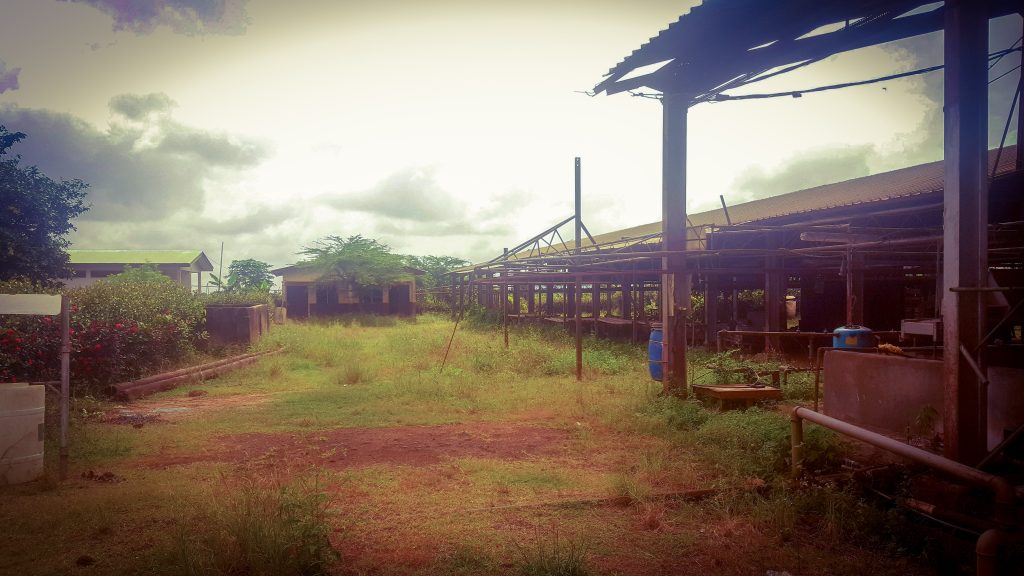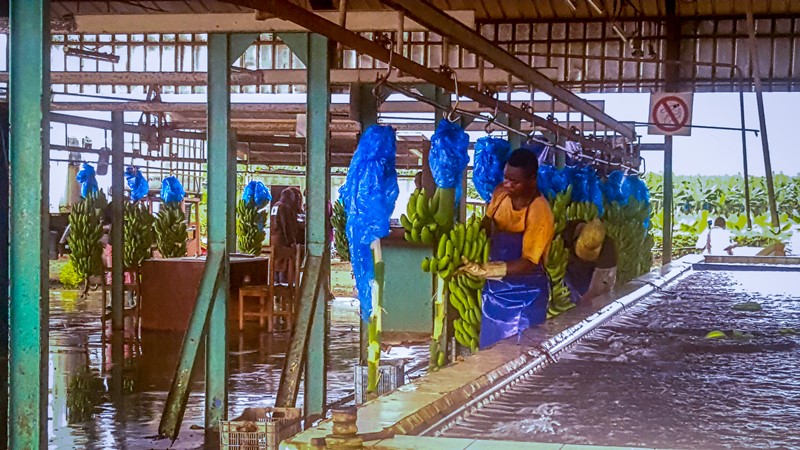The Banana Association of Cameroon, better known by its French acronym, ASSOBACAM, has remarked that the halt in the production and export of bananas has led to a halt in foreign income generated by the trade, which is the main reason behind the currency crisis the country is facing.
The Executive Secretary of ASSOBACAM, Owona Kono, made the remark on July 25, during a recent field visit to banana plantations in the Southwest and part of Littoral Region. The association was on a mission to closed plantations and those where some workers are still braving the odds, to keep the business alive, even without salaries.
[myAds]
Talking about the negative effects of closing down plantations and the non-payment of workers’ salaries, Christopher Ngalla, Banana Group Manager for Tiko said, due to the termination of workers’ salaries, the economy of the Region is being deprived every month, of FCFA 6 billion that is not in circulation.
“Because we have lost a lot of revenue, we are unable to pay our workers; our workers have gone for 12 months without pay, everybody, including myself, hasn’t been paid,” Ngalla said.
On what is being done to remedy the situation, he said: “Efforts are being made to see that work resumes, and for work to resume, there must be security. I am sure you are aware how some of our workers were maimed, fingers chopped off, workers chased from the fields. Some of us have even been kidnapped,” Ngalla narrated.
[myAds]
“We do carry out social responsibilities, because workers still have to go to the hospital. Our hospitals are functioning, and that is a very big burden on the CDC, especially as we have to carry out our social responsibility at a time we are not generating income. We have to provide the camps where workers are, with potable water, we have to provide them with electricity, and it is difficult. Sometimes we have to negotiate with companies providing the facilities. Some of the materials we use in taking care of workers were acquired earlier, but they will soon finish and the services halted too. Just from the beginning of this year, we have lost close to FCFA 32 billion. If work was going on, by this period, we should have generated slightly more than that; we are being conservative here,” Ngalla recounted.
Edwin Ekambi, Agricultural Quality Manager at the Tiko Banana Group recounted that the crisis has tremendously hindered their work. He said the numerous attacks on workers in the plantations, the maiming, and mutilation of workers fingers, has forced activities in the 3,715 hectares farms operated by the CDC to stop. He said work at the CDC has been reduced to that at the office level. He said the standstill in activities by the banana group has resulted in 6,822 workers going for a year without salary.
The team, led by Owona Kono, toured plantations and boxing stations, where banana is prepared and packaged for export. The team made their first stop at the PHP boxing unit in Tiko, where a few workers, though without salary, still brave the odds to work.
[myAds]
It also made a stop at the Tiko DO’s office, where they met the DO, Cletus Anuafor Asongwe, and appealed to him to ensure the safety of the plantations.
Owona Kono told reporters that, due to the inability of the Banana Group to produce and export banana to Europe, the country is facing acute trade imbalance, which accounts for the currency crisis which he warned, may plunge the economy into further chaos.

At the Mafanja I boxing station, one of the biggest of the plantations, the ASSOBACAM team explained that the boxing unit was invaded, workers attacked by separatist fighters, molested, and fingers of some chopped off. The unit, constructed in 1989, and estimated to cost about FCFA 90 million, was burnt down. The team explained that the CDC has 18 of such units, and that four have been destroyed.
From the Southwest, the team drove to Mbanga in the Littoral region, where the unit there was shutdown. Asked why the unit has been shut down, even though there is no insecurity there, Owona Kono told the media that failure in governance is to blame for the unit’s shutdown.
[myAds]
The team also visited other farms at Njombe Penja. The tour ended with the visit to Terminal Mixte Fruitier de Douala, TMFD, led by TMFD’s General Director, Mr. Genoni.
ASSOBACAM Pledges To Revamp Sector
The Cameroon Banana Association has also embarked on a mission to revamp the banana sector in Cameroon which is challenged by security threats, climate change, and financial constraints amongst others.
Owona Kono, after embarking on a tour to understand the concerns and challenges, and in collaboration with the government, seek solutions, said efforts are underway to rescue the situation.
Following a convention signed between the government of Cameroon and ASSOBACAM, the banana sector is expected to increase production to 500,000 tons yearly. Government, on its part, is expected to support the growth and development of the sector. The European Union signed another convention with the government of Cameroon to boost the sector through a project called, Accompanying Measures For the Banana Sector In Cameroon (MAB), which saw the disbursement of over 48,290,000 Euros (about 31.6 billion FCFA),to boost the sector within the period of seven years (June 11, 2013-June 10, 2020).
[myAds]
